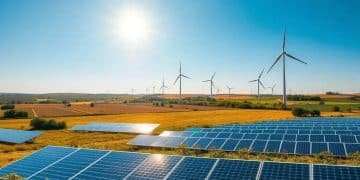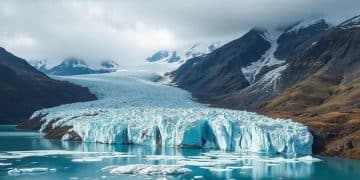Climate change news: what’s impacting our future?

Anúncios
Individuals can contribute to positive change by adopting sustainable habits, supporting renewable energy, and engaging in community initiatives to combat climate change and protect the environment.
Climate change news is crucial in understanding the factors that shape our environment. Have you felt the changes in your own area? Let’s delve into the latest developments and their implications.
Anúncios
Understanding the basics of climate change
Understanding the basics of climate change is essential for everyone. Climate change refers to significant shifts in temperatures and weather patterns over time. While it’s a natural phenomenon, human activities have accelerated these changes.
One major contributing factor is the increase in greenhouse gases in the atmosphere. Carbon dioxide, methane, and nitrous oxide are some key players. They trap heat from the sun, leading to a warmer planet.
Anúncios
The impact of human activities
Transport, industry, and agriculture are significant sources of these emissions. It’s crucial to understand how our daily choices can affect the environment.
- Driving gasoline-powered vehicles
- Using electricity from fossil fuels
- Consuming products with large carbon footprints
Each of these activities releases greenhouse gases into the atmosphere. Small changes in how we live can make a big difference.
The effects of climate change
Climate change is not just about warming. It leads to extreme weather events, rising sea levels, and changes in wildlife habitats. For instance, melting polar ice caps contribute to higher sea levels, which can lead to flooding in coastal areas.
Additionally, increased temperatures can cause droughts in some regions and heavy rainfall in others. These changes affect agriculture, water supply, and even our health. Awareness of these impacts is vital.
In summary, understanding the basics of climate change helps us recognize the importance of our actions. By learning more about the causes and effects, we can make informed decisions.
Latest scientific findings on climate fluctuations
Latest scientific findings on climate fluctuations reveal critical insights into our changing planet. Scientists continuously study climate patterns to understand how they’re affected by various factors.
Recent research has shown that the Earth’s temperature is rising faster than ever before. This is primarily due to human activities, like burning fossil fuels and deforestation.
New evidence in climate science
One significant area of research focuses on the melting of ice sheets in Greenland and Antarctica. As ice melts, it contributes to sea level rise, which can have dire effects on coastal communities.
- Greenland’s ice sheet is losing billions of tons of ice each year.
- Antarctic ice loss has tripled in recent decades.
- Sea-level rise threatens many cities worldwide.
Additionally, scientists are uncovering more about extreme weather events. Heatwaves, hurricanes, and storms are becoming more intense, leading to greater destruction and challenges for communities.
Observations from climate models
Climate models are crucial tools that help researchers predict future climate scenarios. These models incorporate data from various sources, including satellite observations and historical records.
They help us understand potential outcomes if greenhouse gas emissions continue to rise. For instance, projections indicate that global temperatures could increase significantly by the end of the century if no action is taken.
Staying updated on these latest findings is vital for making informed decisions. The more we know, the better prepared we can be for the changes that lie ahead.
Real-world impacts of climate change on communities

Real-world impacts of climate change on communities are increasingly visible. The effects of rising temperatures and extreme weather events are not just distant concerns; they are happening right now.
One major impact is the increase in natural disasters. Communities around the globe are experiencing more frequent hurricanes, wildfires, and floods. These events can lead to significant destruction of homes and infrastructure.
Examples of climate change effects
Coastal areas are particularly vulnerable to rising sea levels. Miami, for instance, faces increased flooding during high tides. As the ocean rises, saltwater intrusion also affects freshwater supplies, which is essential for drinking and irrigation.
- Extreme weather patterns affect agriculture.
- Water shortages are becoming common.
- Health issues are on the rise due to heatwaves.
In addition to environmental issues, climate change has social impacts. Vulnerable populations often bear the brunt of these changes. Low-income communities may lack the resources to recover from disasters, leading to greater inequality.
Community response initiatives
Many communities are taking action to prepare for these changes. Local governments and organizations are implementing strategies to increase resilience. Examples include improving infrastructure and investing in renewable energy.
Educating citizens about climate change is also crucial. Awareness programs can help communities understand the risks and adapt accordingly. Engaging in local initiatives fosters a sense of responsibility and empowerment.
In summary, the impacts of climate change are profound and multifaceted. Recognizing these realities is essential for fostering stronger and more resilient communities.
Innovative solutions to combat climate effects
Innovative solutions to combat climate effects are essential as we face the challenges of a changing planet. Numerous technologies and practices are being developed to reduce greenhouse gas emissions and adapt to the impacts of climate change.
One key area of innovation is renewable energy. Solar, wind, and hydroelectric power are becoming more accessible and affordable. These energy sources help reduce reliance on fossil fuels, leading to lower carbon emissions.
Examples of renewable energy technologies
Solar panels are a popular choice for homeowners and businesses. They convert sunlight into electricity, which can power homes and reduce electricity bills.
- Wind turbines harness wind energy to generate power.
- Hydro power uses flowing water to produce electricity.
- Geothermal systems tap into the Earth’s heat for energy.
Aside from energy generation, there are also advancements in energy efficiency. Smart home technology can manage energy use, lowering consumption and saving money.
Community initiatives and partnerships
Many communities are adopting sustainable practices. Local governments, businesses, and organizations are working together to implement green initiatives. Urban farming is gaining popularity, allowing communities to grow food locally, reducing transportation emissions.
Protecting natural ecosystems is another important strategy. Reforestation can not only absorb carbon dioxide but also provide habitats for wildlife. Moreover, conservation efforts help maintain biodiversity, which is vital for a healthy planet.
Educating individuals about sustainability is also crucial. Workshops and programs can empower people to make eco-friendly choices in their daily lives. These small actions can lead to significant collective impacts.
How individuals can contribute to positive change
How individuals can contribute to positive change is a vital topic in the fight against climate change. Each person has the power to make choices that help protect the environment.
One of the simplest ways to start is by reducing energy consumption at home. Turning off lights when leaving a room and unplugging devices when not in use can make a significant difference. Using energy-efficient appliances is another great step.
Adopting sustainable habits
Embracing a more sustainable lifestyle involves making small changes in daily routines. This can include:
- Using reusable bags, bottles, and containers.
- Opting for public transportation, biking, or walking instead of driving.
- Reducing meat consumption and choosing local, seasonal foods.
By making these choices, individuals reduce their carbon footprints and promote a healthier planet.
Getting involved in community efforts
Joining local environmental groups can enhance your impact. These groups often organize events like tree planting, clean-up drives, and educational workshops. Taking part in such activities fosters a sense of community while promoting awareness.
Education is also key. Sharing knowledge about environmental issues with friends and family can inspire them to take action as well. Encouraging discussion about climate change leads to greater awareness and urgent action.
Incorporating sustainability into voting choices is essential as well. Supporting policies and leaders that prioritize environmental protection can lead to substantial changes at a larger scale. Every vote counts in shaping a greener future.
FAQ – Frequently Asked Questions about Combating Climate Change
What are some simple ways individuals can reduce their carbon footprint?
Individuals can reduce their carbon footprint by using energy-efficient appliances, reducing water usage, and opting for public transportation or biking.
How can local communities get involved in sustainability initiatives?
Local communities can organize clean-up drives, tree-planting events, and educational workshops to promote sustainability.
Why is it important to support renewable energy sources?
Supporting renewable energy reduces dependence on fossil fuels, lowers greenhouse gas emissions, and promotes cleaner air and water.
How can I educate others about climate change?
You can educate others through community workshops, social media campaigns, or simply by sharing knowledge with friends and family about climate issues and solutions.






